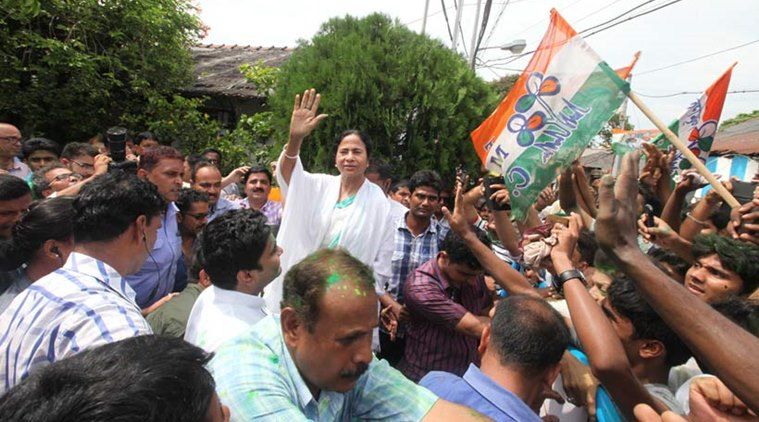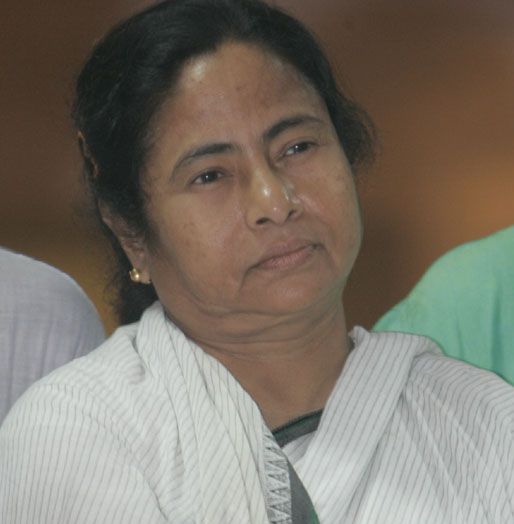The first women chief minister of West Bengal Mamata Banerjee remains in power.
Thursday 19th of May 2016

Sharing is caring
West Bengal Chief Minister Mamata Banerjee declared victory. "It is the magic of Ma, Maati, Manush, and not mine," she told reporters at her residence. "Mamata belongs to the Manush (the people), “she grinned amid loud cheers from her supporters.
Mamata magic has worked yet again in West Bengal, silencing all speculations of a Left fight back, and her Trinamool Congress party emerged mightier than before with more than a two-thirds majority, winning 211 seats out of 294.
It's celebration time outside Trinamool Congress chief Mamata Banerjee's residence in south Kolkata. The party, which defeated Left Front in the historic 2011 Assembly elections, is coming back for a second term in 2016. It's no secret that TMC has had a challenging first term. The Left Front, which sat in opposition for the first time in 34 years, was unsparing in its attack. The people of Bengal have given the verdict: they are willing to give TMC another chance. The party has bagged 219 out of the total 294 assembly seats. Mamata Banerjee and her ministers are set to take oath on 27 May.
Political Journey of Mamata Banerjee
- 1976 - 1980: General Secretary of Mahila Congress (I) in West Bengal
- 1978-1981: Secretary of the District Congress Committee (Indira) of Calcutta South
- 1984: Elected as a member of the 8th Lok Sabha. Also became the General Secretary of the All India Youth Congress (I).
- 1985-1987: Member of the Committee on Welfare of Scheduled Castes & Scheduled Tribes
- 1987-1988: Member of Consultative Committee of the Ministry of Human Resource Development, National Council of All India Youth Congress (I), Consultative Committee on Ministry of Home Affairs
- 1988: Executive Committee Member of the Congress Parliamentary Party
- 1989: Executive Committee Member of the Pradesh Congress Committee of the state
- 1990: West Bengal’s Youth Congress President
- 1991: Member of the 10th Lok Sabha (her second election to the LS)
- 1991-1993: Union Minister of State for Department of Youth Affairs and Sports, Human Resource Development, Women and Child Development
- 1993-1996: Member of the Committee on Home Affairs
- 1995-1996: Member of Committee on Public Accounts, Consultative Committee Member of the Ministry of Home Affairs
- 1996: Elected as a member of the 11th Lok Sabha (third time)
- 1996-1997: Member of Consultative Committee of the Ministry of Home Affairs, Committee on Home Affairs
- 1997: Founded the All India Trinamool Congress and became its Chairperson
- 1998: Re-elected as a member of the 12th Lok Sabha (fourth time)
- 1998 – 1999: Chairperson of the Committee on Railways, Member of the Ministry of Home Affairs' Consultative Committee, Member of the General Purposes Committee
- 1999: Elected as member of the 13th Lok Sabha (fifth time); Appointed as Member of General Purposes Committee; Leader of the All India Trinamool Congress in the Lok Sabha
- 13 October 1999-16 March 2001: Union Cabinet Minister of Railways
- 2001-2003: Consultative Committee Member of the Ministry of Industries
- 8 September 2003-8 January 2004: Union Cabinet Minister but without any portfolio
- 9 January 2004-May 2004: Union Cabinet Minister of Coal & Mines
- 2004: Elected as a member of the 14th Lok Sabha for the sixth time. Also became a Member of Committee on Law & Justice, Public Grievances and Personnel.
- 5 August 2006: Member of Home Affairs Committee
- 2009: Elected as a member of the 15th Lok Sabha (seventh time)
- 31 May 2009-19 July 2011: Union Cabinet Minister for Railways; Leader of All India Trinamool Congress in the Lok Sabha of the Parliament
- 9 October 2011: Resigned from membership of the 15th Lok Sabha
- 20 May 2011: Became the first woman Chief Minister of West Bengal.
Activities and Achievements of Mamata Banerjee
- Mamata Banerjee successfully formed a new party after separating from the Congress in 1997. The new party, All India Trinamool Congress, subsequently, became the primary opposition party in West Bengal led by the CPI(M).
- In 2002, after becoming the Railway Minister, she introduced new trains, made extension of a few express train services, increased frequency of some trains aimed at developing tourism and also proposed the Indian Railway Catering and Tourism Corporation.
- She actively protested on 20 October 2005 against forcible land acquisition of farmers and agriculturists for industrialization in West Bengal by the then Left Front government led by Buddhadev Bhattacharya.
- She introduced several non-stop Duronto Express trains that connected major cities, other passenger trains and ladies-special trains during her second term as Railway Minister, from 31 May 2009 to 19 July 2011.
- The alliance of All India Trinamool Congress, the Indian National Congress and SUCI won 227 seats (TMC -184, INC – 42, SUCI – 1) in the 2011 Legislative Assembly Elections of West Bengal, resulting in a washout of the Left Front.
- On 20 May 2011, she became the first woman Chief Minister of West Bengal marking the end of the 34-year-long Left Front government.
Represented India in the U.N. General Assembly
- Represented the nation at the World Women Round Table Conference held at Russia as a woman parliamentarian.
- Attended World Youth Conference at Vietnam as a representative of India.
- Attended the Working Women Conference of ICFTU and ILO held at Kuala Lumpur.
- Observed dharna for 21 days in 1991 to restore human rights.
- Observed protests against deaths in lock-ups and atrocities on women in India, particularly in West Bengal.
- Mamata Banerjee is also credited with taking initiative to solve the longstanding Gorkhaland problem. On 2 September 2011, a semi-autonomous body called the Gorkhaland Territorial Administration (GTA) was formed to administer Darjeeling. The GTA has financial, administrative and executive power, excluding legislative powers.
Books by Mamata Banerjee in Bengali
- Upalabdhi
- Maa-Mati-Manush
- Janatar Darbare
- Manavik
- Motherland
- Anubhuti
- Trinamool
- Janmaini
- Ashubho Shanket
- Jago Banglaa
- Ganotantre Lajja
- Andolaner Katha
- Books by Mamata Banerjee in English
- Smile
- Slaughter of Democracy
- Struggle for Existence
- Dark Horizon
Awards won by Mamata Banerjee
The Time magazine in 2012 mentioned her among the 100 Most Influential People in the World The Bloomberg Markets magazine marked her as one of the "50 Most Influential People in the World of Finance" in September 2012.
General Information Mamata Banerjee
- 8th Chief Minister of West Bengal: 20 May 2011(Assumed office) | Governor: M. K. Narayanan, D. Y. Patil (Acting), Keshari Nath Tripathi | Preceded by: Buddhadeb Bhattacharjee.
- Minister of Railways (In office): 22 May 2009 – 19 May 2011 | Preceded by: Lalu Prasad Yadav | Succeeded by: Dinesh Trivedi.
- Member of Parliament for Kolkata Dakshin (In office): 1991–2011 | Preceded by: Biplab Dasgupta | Succeeded by: Subrata Bakshi.
- Member of Parliament for Jadavpur (In office): 1984–1989 | Preceded by | Somnath Chatterjee | Succeeded by: Malini Bhattacharya
- Member of the West Bengal Legislative Assembly for Bhabanipur: Preceded by: Buddhadeb Bhattacharjee
- Born: 5 January 1955 (age 61), Kolkata, West Bengal, India
- Nationality: Indian
- Political party: All India Trinamool Congress (1997–present)
- Other political affiliations: Indian National Congress (Before 1997)
- Residence: Harish Chatterjee Street, Kolkata, West Bengal, India
- Education: University of Calcutta
- Profession: Politician
- Religion : Hinduism
Sharing is caring
Related Post
Real Estate (Regulation and Development) Act, 2016 comes into force on 1 May 2016
One crore assets geotagged under GeoMGNREGA initiative
58th Grammy's Award 2016
All Mobile Phones Must Have Panic Button Beginning in 2017 in India
First female secretary general of FIFA Council
India’s Second Tallest Flag Pole inaugurated in Kolhapur